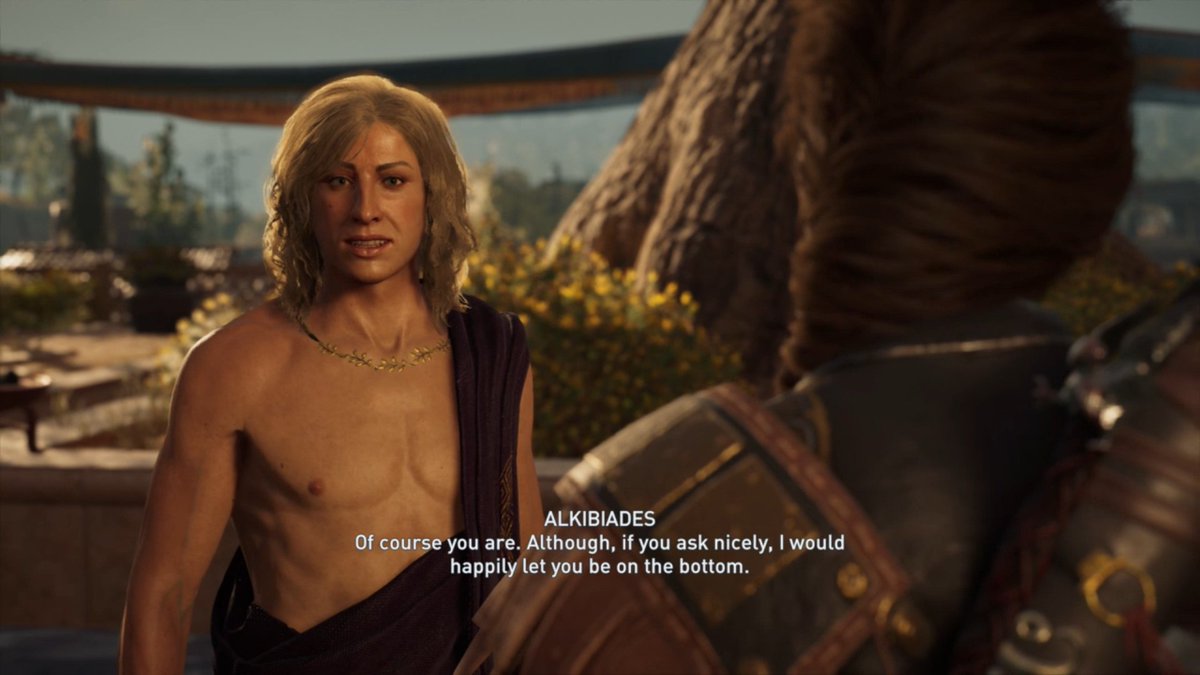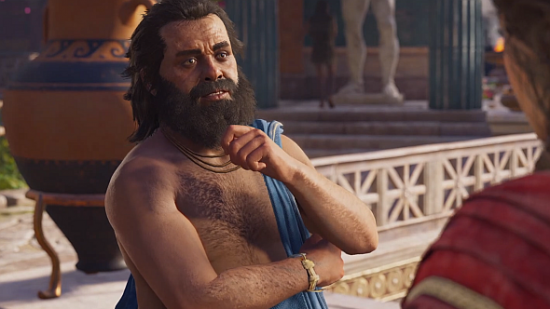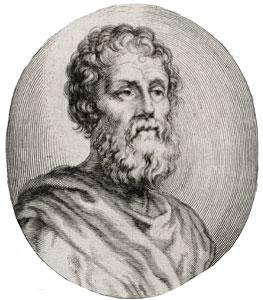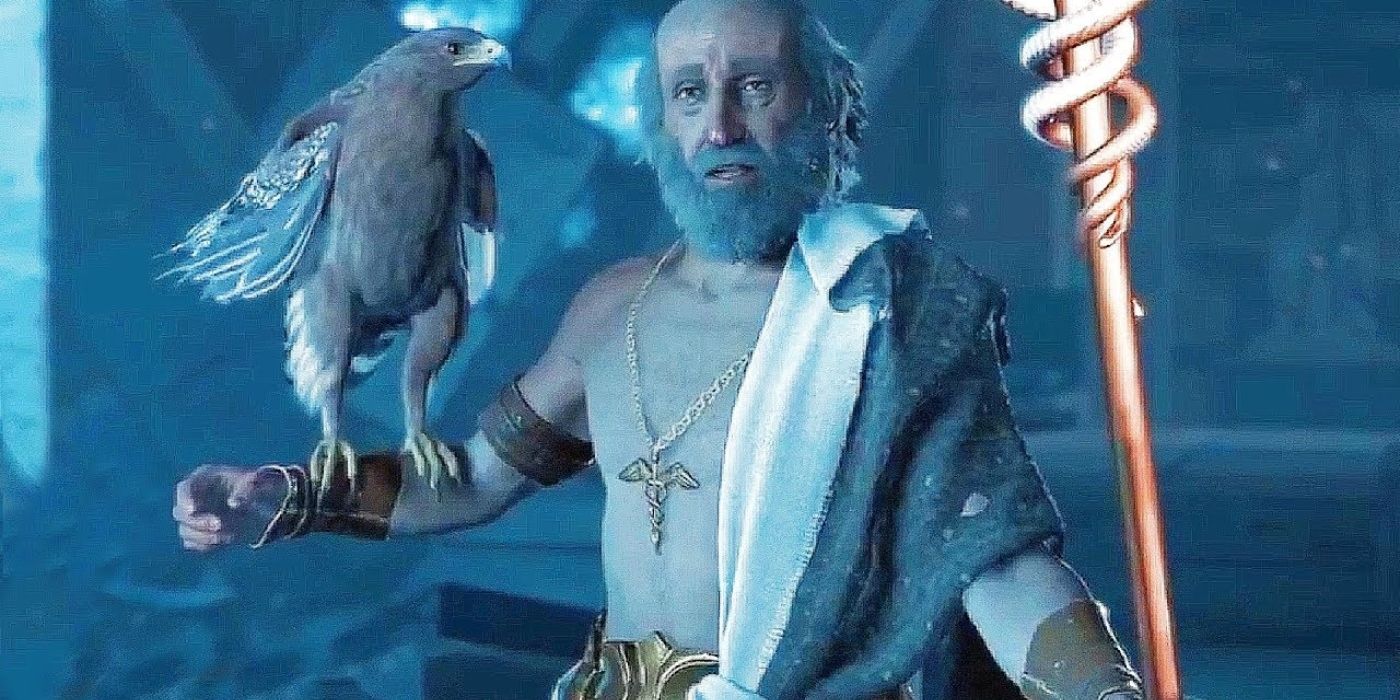Alkibidias
Alcibiades first appears at a gathering hosted by Pericles, where he indulges freely in his notorious lifestyle, characterized by his flamboyant attitude and insatiable libido, often engaging in sexual group activities. When Kassandra seeks information about her mother, Myrrine, Alcibiades agrees to help but only after she fulfills his request for oil from the kitchen to aid in his revelries. Upon completing the task, Alcibiades suggests that Kassandra seek out Anthousa in Korinthia.
Years later, Alcibiades reappears at the docks of Kyllene in Elis, encountering Kassandra as she transports the Spartan pankratist Testikles to the Olympic Games in Olympia. After Testikles meets a tragic end by falling into shark-infested waters, Alcibiades volunteers Kassandra to take his place in the competition. Following her victories in the sparring matches, Alcibiades falls ill, prompting suspicions of poisoning. Kassandra's timely intervention and retrieval of an antidote from Fort Koroibos save his life.
Socrates
Socrates was a classical Greek philosopher. Renowned for his contributions to Western philosophy, he is best known for his Socratic method—a cooperative argumentative dialogue to stimulate critical thinking and illuminate ideas. Unlike many philosophers of his time, Socrates wrote nothing himself. Socrates focused on ethics and the examination of moral concepts such as justice and virtue. Sokrates became the teacher of many important figures. Among them were Plato, and Alkibiades, a relative of Perikles who ruled Athens during its golden age. Socrates’ legacy profoundly influenced his disciples and subsequent philosophical thought.
In 431 BCE, Sokrates was present at the Bouleuterion of Athens, witnessing his mentor and fellow philosopher Anaxagoras being ostracized from the polis through a vote. There, Sokrate met Kassandra, aware then she manipulated the votes which led to Anaxagoras's ostracism. Sokrates later bid the misthios farewell to attend an upcoming symposium at Perikles' residence. Later on at the symposium, Sokrates participated in a debate on the nature of rulers with Thrasymachos. The two were later greeted by Kassandra, who managed to gain access to the symposium by helping Perikles with various errands. They were soon interrupted by the arrival of Aspasia, Perikles' partner. During the plague in Athens, Sokrates was observing the situation and people there. He witnessed the death of Perikles and decided to remain in the city in order to oppose the rhetoric of Kleon, the new leader of Athens and a Sage of the Cult of Kosmos who had taken power after Deimos murdered Perikles. Later, Sokrates and Aristophanes assisted Kassandra in tarnishing Kleon's reputation.
Aristophanes
Aristophanes was a renowned playwright of ancient Athens, known as "The Father of Comedy" and "the Prince of Ancient Comedy". Born around 446 BCE, he authored over 40 plays, with 11 surviving in complete form. Aristophanes has been said to recreate the life of ancient Athens more convincingly than any other author. His powers of ridicule were feared and acknowledged by influential contemporaries. Aristophanes used humor to critique the Peloponnesian War, democracy, and societal norms, blending fantastical elements with biting criticism. Notable plays like "Lysistrata" and "The Clouds" showcase his ability to provoke thought while entertaining audiences. Aristophanes' second play, "The Babylonians", was denounced by Cleon as slander against the Athenian polis. It is possible that the case was argued in court, but details of the trial are not recorded and Aristophanes caricatured Cleon mercilessly in his subsequent plays, especially The Knights, the first of many plays that he directed himself. Aristophanes' contributions significantly shaped the genre of comedy and left a lasting impact on theatrical literature.
At the age of 15, Aristophanes became affiliated with numerous intellectual individuals in Athens and soon became a part of the circle affiliated with Perikles. Aristophanes was one of the individuals invited by the statesman Perikles to attend a symposium at his villa. Due to Aristophanes' comical style of writing, Sophokles was not happy that Euripides associated himself with him. A while later, Aristophanes and Euripides met the misthios Kassandra, who came to the symposium to seek information about her mother's whereabouts. Kassandra served him and Euripides drinks in exchange for information from the latter. Around the same time, Aristophanes came into constant conflict with fellow playwright Hermippos, who was secretly a member of the Cult of Kosmos and openly voiced his support of Kleon, a rival of Perikles. While talking with Sokrates about Hermippos near the Akropolis Sanctuary, Aristophanes was approached by Kassandra, who questioned him about his conflict with Hermippos. Aristophanes requested Kassandra to look for Hermippos and investigate his affiliation with Kleon and learned of his affiliation with the Cult.
Hippocrates
Hippocrates, often regarded as the "Father of Medicine," was a Greek physician and philosopher born around 460 BCE on the island of Kos. He is best known for establishing medicine as a profession distinct from other fields such as theurgy and philosophy, emphasizing clinical practice and observation. Hippocrates founded the Hippocratic School of Medicine, which revolutionized the medical field in ancient Greece by advocating for systematic study and ethical standards, encapsulated in the Hippocratic Oath. His contributions laid the foundation for modern medicine, promoting a rational and empirical approach to healthcare and enduring through centuries as a pivotal figure in medical history.
In his youth, while serving as a healer assistant, Hippokrates met a Spartan woman named Myrrine. Myrrine, who was carrying a heavily wounded Alexios, sought him out for medical aid. Hippokrates however was forced to turn Myrrine down due to his inexperience and sent her to the Sanctuary of Asklepios for help instead. That encounter left an impression on Hippokrates, such that he swore to never turn away another patient who sought his aid. By the time of the Peloponnesian War, Hippokrates had become an experienced physician. While Hippokrates was well renowned amongst the Greek world for his skill, his philosophy, and theory that diseases were caused naturally were not well-received amongst the Priests of Asklepios, including the priestess Chrysis, who confided in the "traditional" way of healing, which was praying to the gods. While Hippokrates was treating a patient in need of aid, he was greeted by Kassandra who immediately requested his knowledge of her mother. In exchange for telling Kassandra what he knew, Hippokrates requested her to recover his notes that had been stolen and taken to Fort Tiryns. However, Hippokrates' notes had been burned by the fort's guards and as such, Kassandra returned with another physician named Dymas, who managed to memorize the notes before they were burned. After tasking Dymas to recreate the notes, Hippokrates spoke to Kassandra, revealing his encounter with Myrrine years ago. He then suggested that Kassandra speak to the elder priest at the sanctuary of Asklepios, believing she may find more information there.
Phidias
Phidias was a renowned ancient Greek sculptor, painter, and architect, celebrated for his masterful works during the 5th century BCE. He is best known for creating the statue of Zeus at Olympia, one of the Seven Wonders of the Ancient World, and the statue of Athena Parthenos in the Parthenon in Athens. Phidias' work exemplified the classical style, characterized by its idealized beauty and grandeur. His contributions significantly influenced the art and culture of ancient Greece, establishing a legacy of artistic excellence. Despite his achievements, Phidias faced accusations of embezzlement and impiety, leading to his eventual downfall and mysterious death.
Phidias became one of the targets wanted by the Cult of Kosmos, who intended to send their member Brison to assassinate him in Athens. Perikles learned of this plot and, hoping to protect and ensure his safety, had him accused of multiple offenses and awaiting trial, meanwhile assigning soldiers to stand guard outside his workshop.[6] Before being confined to his workshop, Phidias was able to send word to his friend Theras on the island of Seriphos, alerting him of his situation. Sometime thereafter, Phidias was visited by the the misthios Kassandra, whom Perikles had sent to secretly bring him safely out of Athens. Phidias informed her of the plot to murder him—lightly veiled under the idea of a legal trial to imprison him. Needing to leave, Kassandra agreed to escort him out of Athens to Seriphos, where his friend Theras would be able to shelter him.
Sometime later, Phidias moved on from Seriphos, and was back in Olympia, working again in his new workshop. There, he met Kassandra again, paranoid at the constant threat the Cult posed. He had received a Spartan scytale and asked for Kassandra's help to decode the message. He tasked Kassandra to look for the symbol on the Statue of Zeus in the Temple of Zeus. The coded message referenced other statues, which Kassandra agreed to travel to and help decode all the messages. During the time that Kassandra was searching for the symbols, Phidias was interrogated and tortured by Deimos, the Cult's enforcer, for information on the mysterious symbols. Having only studied the symbol of the Statue of Zeus, the only things Phidias was able to say about them were only "Itira! Korgath! Metin!". Unsatisfied with his constant blubbering, Deimos beat the sculptor to death. Phidias' body was discovered by Kassandra sometime later, lamented that she shouldn't have left him alone.
Pythagoras
Pythagoras was an ancient Greek philosopher and mathematician, best known for the Pythagorean theorem in geometry. Born around 570 BCE on the island of Samos, he founded a religious movement known as Pythagoreanism. Pythagoras believed in the transmigration of souls and that reality could be understood through mathematics. His followers, the Pythagoreans, adhered to a strict lifestyle and contributed significantly to mathematics, music theory, and astronomy. Though much of his life remains shrouded in legend, Pythagoras' influence on philosophy and science is profound, establishing principles that would shape Western thought for centuries.
Pythagoras character is revealed to be the father of the protagonist, Kassandra, through a connection to the ancient Isu civilization, which the series often intertwines with historical narratives. Pythagoras resides in a secretive location, the ancient cave of the Island of Thera, guarding the powerful artifact known as the Staff of Hermes Trismegistus. This staff grants him extended longevity, allowing him to live far beyond a typical human lifespan. His long life has been dedicated to understanding the mysteries of the Isu and protecting humanity from the dangers posed by their advanced technology. Kassandra encounters Pythagoras during her quest to uncover her family's secrets and the greater threats facing the Greek world. He provides crucial information and guidance, emphasizing the balance between knowledge and power. Through their interactions, Pythagoras' role in the game's narrative expands, blending his historical contributions to mathematics and philosophy with the mythical lore of the Assassin's Creed universe, ultimately highlighting his significance as both a scholar and a guardian of ancient wisdom.
Demosthenes
Demosthenes was a prominent Athenian statesman and orator in ancient Greece, renowned for his powerful speeches and unwavering opposition to Macedonian expansion under Philip II and Alexander the Great. Born in 384 BCE, he overcame early personal and speech difficulties to become a leading political figure. His speeches, known as the Philippics, rallied Athenians against the Macedonian threat. Despite his eloquence and efforts to preserve Athenian independence, he ultimately faced political defeat. Demosthenes' legacy endures as one of the greatest orators in history, embodying the struggle for Greek autonomy and democratic principles.
Demosthenes was not content with how his leaders in the Athenian army waged the war. Preferring a different approach, he devised his own strategy and tasked the misthios, Kassandra several times with gathering seals from Spartan generals in order to weaken their army. His Spartan counterpart, Lysander, did the same in turn.














0 comments:
Post a Comment